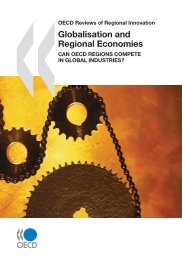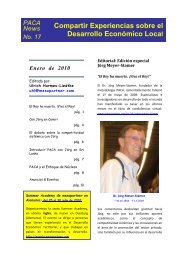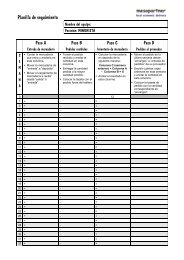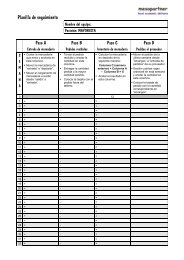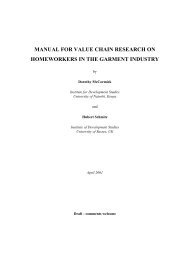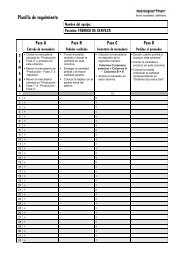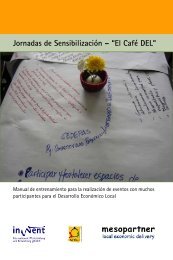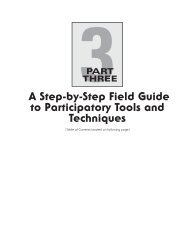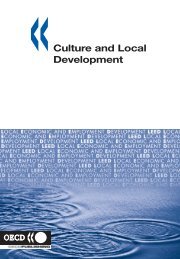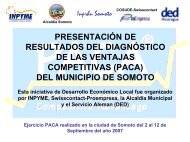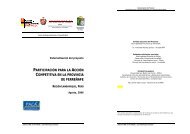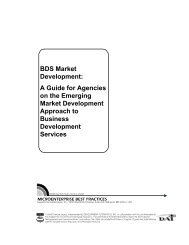R Chambers - Notes for participants in PRA-PLA course.pdf - PACA
R Chambers - Notes for participants in PRA-PLA course.pdf - PACA
R Chambers - Notes for participants in PRA-PLA course.pdf - PACA
You also want an ePaper? Increase the reach of your titles
YUMPU automatically turns print PDFs into web optimized ePapers that Google loves.
19<br />
3. Some Frontier opportunities and challenges 2005-2010<br />
• Re-energis<strong>in</strong>g <strong>PRA</strong>/<strong>PLA</strong> practitioner/facilitators with enthusiasm, releas<strong>in</strong>g creativity<br />
and <strong>in</strong>novation<br />
• Re<strong>for</strong>mulat<strong>in</strong>g the whole <strong>PRA</strong>/<strong>PLA</strong> th<strong>in</strong>g, <strong>in</strong> a participatory way, perhaps def<strong>in</strong><strong>in</strong>g it<br />
as hav<strong>in</strong>g evolved <strong>in</strong>to participation, reflection, and action, with a consensual<br />
statement of basic values which would <strong>in</strong>clude diversity, process and change.<br />
• Mesh<strong>in</strong>g community-level participatory plann<strong>in</strong>g and action with local government<br />
and limited resources<br />
• <strong>PRA</strong>/<strong>PLA</strong> and participation <strong>in</strong> complex political emergencies and dangerous<br />
conditions (the tsunami presents special challenges)<br />
• Visuals by children, <strong>in</strong>clud<strong>in</strong>g presentation and analysis of complex realities by<br />
children <strong>in</strong> NFE and ma<strong>in</strong>stream primary curricula<br />
• Better understand<strong>in</strong>g of diagramm<strong>in</strong>g cf verbal analysis<br />
• Practical, analytical and ethical aspect of generat<strong>in</strong>g numbers through participatory<br />
methods and approaches, and develop<strong>in</strong>g and spread<strong>in</strong>g these as alternatives to<br />
questionnaires<br />
• Empowerment through participatory video, theatre etc<br />
• Chang<strong>in</strong>g the cultures and practices of teach<strong>in</strong>g and tra<strong>in</strong><strong>in</strong>g <strong>in</strong>stitutes, colleges and<br />
universities, and of teachers, tra<strong>in</strong>ers and lecturers, <strong>in</strong>clud<strong>in</strong>g basics like seat<strong>in</strong>g<br />
arrangements, not lectur<strong>in</strong>g etc, to reduce the embedd<strong>in</strong>g of top-down relationships.<br />
• Trans<strong>for</strong>m<strong>in</strong>g fund<strong>in</strong>g agencies’ procedures, <strong>in</strong>centives and cultures<br />
• Replac<strong>in</strong>g logframe-type approaches with agreements on pr<strong>in</strong>ciples (nonnegotiables)<br />
and process, and with participatory M and E<br />
• Downward accountability<br />
• L<strong>in</strong>k<strong>in</strong>g PPAs effectively with policy and practice – lots of process and ownership<br />
issues (watch the ongo<strong>in</strong>g Rwanda PPA)<br />
• The spread of <strong>PRA</strong> <strong>in</strong> countries with few NGOs (Iran, Ch<strong>in</strong>a, Russia, Myanmar….)<br />
• More recognition and opportunities <strong>for</strong> the new generation of younger <strong>PRA</strong> tra<strong>in</strong>ers<br />
and practitioners<br />
• Cost-effective network<strong>in</strong>g us<strong>in</strong>g electronic wizardry<br />
• Internalis<strong>in</strong>g relationships of partnership (N-S, NGO-local people, NGO-<br />
Government, donor- and lender- “recipient” etc) <strong>in</strong>clud<strong>in</strong>g exchanges<br />
• Diversity of concepts of illbe<strong>in</strong>g and wellbe<strong>in</strong>g<br />
• ABC (Attitude and Behaviour Change), by whatever name, especially <strong>in</strong><br />
Governments, fund<strong>in</strong>g agencies, large NGOs, and universities and tra<strong>in</strong><strong>in</strong>g<br />
<strong>in</strong>stitutions, <strong>in</strong>clud<strong>in</strong>g modules, exercises, field experiences etc, and learn<strong>in</strong>g what is<br />
feasible and what is not, and what works and what does not. Much more self-critical<br />
reflection <strong>in</strong> tra<strong>in</strong><strong>in</strong>g and practice.<br />
• Immersion learn<strong>in</strong>g experiences <strong>for</strong> top people (from fund<strong>in</strong>g agencies, government,<br />
and not only the World Bank which has pioneered this and not been much followed –<br />
yet! (January 2004)<br />
• Putt<strong>in</strong>g personal, professional and <strong>in</strong>stitutional change and relationships <strong>in</strong> the centre<br />
of development policy and action. Isn’t it obvious? To the po<strong>in</strong>t of embarrassment



